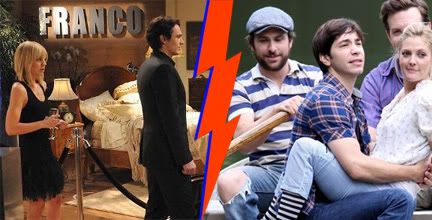
& so begins what I assume will be a recurring post theme, as I often find myself thinking in such constructions: two pieces of pop culture debris tumble into my consciousness, both of which I'm a more than a little dubious about, & the veritable mail-sorter that is my brain (though, admitted, it's sometimes faulty) lets one slide through & forth to its intended, while the other is filed under Return to Sender, with hopes that it blow up royally in said individual's face upon arrival. So, without further ado, here are today's contenders:
Charlie Day Becoming a Big-Screen Comedy Star.
James Franco Becoming a Pretentious Douchebag.
I'm a huge fan of It's Always Sunny in Philadelphia, & Charlie is by far my favorite character, so I suppose I ought to applaud his continued success. However, it's in a really bland-looking Drew Barrymore romantic comedy—&, moreover, most successful mainstream comedians lead wildly depressing lives of artistic compromise & drug addiction, & I wouldn't wish that on anyone, especially someone who is truly talented. Meanwhile, though he is one of the more attractive humans to grace the planet (no, seriously: his smile chases away stormclouds), James Franco has officially renounced the world of cinema in favor of masturbation ironic/postmodern performance art, by designing his own recurring role on the soap opera General Hospital. While this means that we are safe from another Franco butchering of beloved Beat icons (or, Tristan & Isolde 2: People Looking Even Sexier On a Beach), it also means that he will be smarming & winking all over Freshmen girls in the Columbia library again this year—&, even worse, that we are forced to put up with his ridiculous notion that he is an artiste, with an "e" & a beret & a fuckload of undeserved 'tude.
Though there was likely little mystery to this one, let's see our final results.
I Am Okay With: Charlie getting big parts for big bucks.
At least for now. The moment I see the straight-to-DVD Santa Clause 4: All Elf Breaks Loose in my local CVS, with Charlie cast as Santa's most cantankerous workman, I'm personally pulling the plug on this thing. But today, I tend to take same position as the folks in this Entertainment Weekly article (I know, ick, but they make a valid point): that Charlie Day is awesome—not only because he is hilarious, but because, though his Sunny character is at times repulsive, insane, & wildly stupid, he is always eminently lovable, which is a serious performative feat. I agree, too, that I'd be interested to see what he does with a more dramatic (or, at least, less regressed) role; I think my vote may change on this one if he's continually typecast, doomed to play various iterations of his first successful character until the day he fades from the screen (see: Michael Cera, Jack Black, Adam Sandler, on & on). So, with fingers crossed, I will tolerate this upcoming Drew Barrymore/Justin Long "HEY AMERICA, WE'RE FAMOUS & WE'RE GOING OUT" showcase—or, more accurately, I will tolerate Day's role in it. & I may even tolerate this "Horrible Bosses" movie if it ever actually comes to fruition, especially because Michael Bluth ought to have far more work than he does.
Now, because we're thinking positive (/ as a buffer against the vitriol that threatens to spew forth in the next section), here are some of my favorite television moments ever, ever:
[ NOTE: Of course, my very favorite one—from the musical episode, in which Charlie repeatedly asks Dennis to "take a five"—is nowhere to be found online. Ah, the best laid plans... ]
I Am Not Okay With: what a complete & total asswipe James Franco has turned out to be.
"You got a very special interview... Yeah, you got a very special interview."
Oh, put the camera down, you walking midlife crisis beacon. Not only do I rarely tolerate your chosen crossover medium (& I have a hilarious David Sedaris story to back me up), but your particular brand of "I'm an artist now" elitism—the manufactured veil of obscurity over these projects, as if anyone would ever think they were important—is one of the things that pisses me off so eternally about such insular, hyper-"intellectual" pursuits, because they will forever cast a shadow on creative types & often scare people away from modern art. I mean, clearly I'm just too unenlightened, too entrenched in the hoi polloi to view you as anything other than an utter hack & dilettante; my supreme dislike must have nothing to do with the fact that art ought to unite people—ought to stir them, change them—not make them wonder why such a rich, famous man is stooping to the level of (gasp!) daytime television.
Is there anyone else who finds it so wildly up-his-own-ass masturbatory that this "art" is centered around ironic placement of his own famous face? I remember laughing out loud when I read the Wall Street Journal article—entitled "A Star, a Soap, & the Meaning of Art" (I shit you not)—in which he explains that by being on General Hospital ironically, he is actually trying to make people respect the medium he was de facto insulting. In his own words:
I disrupted the audience's suspension of disbelief, because no matter how far I got into the character, I was going to be perceived as something that doesn't belong to the incredibly stylized world of soap operas. Everyone watching would see an actor they recognized, a real person in a made-up world. My hope was for people to ask themselves if soap operas are really that far from entertainment that is considered critically legitimate. Whether they did was out of my hands.
Poor, tortured performance artist, ever misunderstood! In all your artistically significant questioning, did you perhaps stop to question that the very conceit of your project assumes soap operas to be unworthy of your time—so much so that you recognize the debasement involved in appearing on one with your (self-proclaimed) eminently recognizable face? I'm amazed that they were willing to have you at all, seeing as the very point of your presence was to highlight their perceived worthlessness—even as you claim to be somehow subverting it.
Later in the article, Franco ("just Franco") describes a current performance artist whose work consists of making "ecologically productive front lawns." Apparently, in a presentation at Columbia this past November (oops: missed that one), this artist said—while exchanging Oh Captain, My Captain glances with his new prodigy, I imagine—"Being an artist is the one profession where you can wake up and say, 'What do I want to learn about and participate in today?'" to which our Green Goblin wonders, "What could be more fun than that?"
The answer is, of course, nothing. If I were able to choose my profession, from all of those in the world, it would not be music video director, screenwriter, author, graphic designer, movie critic, actress—or even performance artist—but rather a wealthy celebrity with the liberty to dabble in all of these. & this is what I think is most lacking in Mr. Franco's evaluation of his own "work": recognition of the immense privilege that allows him to pursue it. (Which is especially ironic, because that's all performance art is ever about—questioning, ever questioning, its own circumstances.)
Also, I think it's important to note that as an artist of this kind, "learning" & "participating" come with a pre-applied sheen of non-participation, of irony—the kind that I find really, strongly distasteful. In the minds of these men, the tackiness of soap opera rolls off Franco's back like rain off a hermetically sealed duck, because he's not actually a soap opera actor—just as the man who so inspired him is not actually a landscaper. What they're doing is so much more significant than these lowly professions, can't you see? They're commenting on them.
Though I'm a massive advocate of media that questions itself—metafilm, metaficiton—I feel like things start to go downhill when there is more questioning going on than media-ing. Though I could regale you with the meta implications of Pale Fire from dawn to dusk, it is, first & foremost, a truly beautiful piece of fiction—just as Living in Oblivion, Adaptaion, & The Prestige are truly good movies—of which self-reference happens to be a part. Much like aleatory Dadist poetry, composed of nonsensical sounds & syllables, performance art tends to be the distillation of self-reflexivity, without much further content; it will seem stupid or insane, will be fundamentally un-entertaining until you read the program (or, the Wall Street Journal article) & thereby key into what you're supposed to be seeing. I will be the first to applaud a piece of theater that confronts its audience—even one that leaves some of its implications unclear—but I do demand that there be something there outside of comment-for-comments'-sake, & performing real-life actions ironically is something I really can't get behind. Take, for example, the opening of the article:
I was recently treated to an early prototype of a dessert that Marina Abramović, the "grandmother of performance art," created with the pastry chef Dominique Ansel. It's a cylindrical pastry with a lychee center sprinkled over with chili powder and raw gold. I was instructed to kiss a napkin that had been printed with a square of gold powder that would transfer to my face before eating the dessert. This way the dessert would pass through a golden gateway before it was ingested. I did as told, then suggested to the chef that it needed more chili. Was this art?
No, James Franco, that was you being a douchebag to a chef.
Today's Headphone Fodder:
Paris—Hans Unstern.
My parents recently returned from their Barcelona/Berlin honeymoon baring gifts, which meant for me a pin guaranteeing lifetime free admittance to the Ramones Museum, a necklace made of zippers, & a copy of Spex, a German pop culture magazine that includes a CD with every issue. From the latter in this list of wonder, I've extracted the above track, Paris—which is, German or no, pretty much an ideal song as far as I'm concerned. I love the doubled vocals, the monotone-until-it's-not, the surges, the carnival noises, the serious alliteration, the wordplay (which you can still kind of pick up on, I think, even without German)—the lyrics overall, which are often particularly beautiful. Though I don't feel confident enough (in my translation abilities / that you care to know) to translate the whole song, I'll at least give you the first few lines as best I can:
When will I learn that night can paint no shadows without a moon?
(Period, period, comma, dash, end.)& when will I see a face that no longer reminds me of you?
When? Hours-, days-, years-long?


"WILL YOU TAKE A FIVE PLEASE??"
ReplyDelete